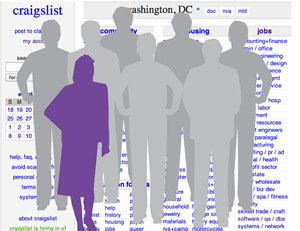 Recently my company posted a freelance project on Craig’s List. It’s not a very exciting opportunity – just basic data entry work 5-10 hours per week. The work is simple, repetitive and the pay isn’t great, but to compensate we are allowing a totally flexible work option. The person must be local because we need local geographic familiarity but he/she will be able to work from home (or a boat or a favorite ski slope or wherever). As long as an appropriate amount of good quality work is completed each week, we’re not going to micromanage the process.
Recently my company posted a freelance project on Craig’s List. It’s not a very exciting opportunity – just basic data entry work 5-10 hours per week. The work is simple, repetitive and the pay isn’t great, but to compensate we are allowing a totally flexible work option. The person must be local because we need local geographic familiarity but he/she will be able to work from home (or a boat or a favorite ski slope or wherever). As long as an appropriate amount of good quality work is completed each week, we’re not going to micromanage the process.
The posting seemed pretty straightforward and admittedly not all that interesting for a lot of folks, but you would not believe the response we received – over 120 responses! Our little freelance gig attracted respondents ranging from eager college students to extremely experienced professionals with advanced degrees. For a crummy little data entry project! I am overwhelmed and grateful that so many people would consider helping us with our projects. Can you imagine what kind of response a really great opportunity must attract?
So how can a job applicant stand out amid so much competition?
In our case, I grew increasingly frustrated as I reviewed the submissions and sorted them into four groups: 1) consider for interview, 2) maybe interview, 3) no/not a good fit and 4) “oh, hell no.” I’m no human resources expert (just a very busy entrepreneur), but here are some tips for job seekers based on my experience as the schmoe on the other side of the job query emails. Hope some of you will find this helpful.
Your objective is to get to the next step in the selection process
As with any complex business to business sales process, your objective in the job search should be to get to the next step in the selection process. When you respond to a job listing, you want to make sure you jump two hurdles: a) avoid an immediate rejection and b) entice the hiring manager to review your resume and move you to the next level of consideration. You can’t necessarily predict what the next level will be. Perhaps it is having your resume reviewed by other people in the company, perhaps it is going directly to a phone interview.
The company will expect to have its own hurdles to jump in the selection process. Will you like the company and its culture better than competing companies? Will the pay range meet your requirements? Will the job description be challenging enough to keep you interested, but not so challenging that you’ll want to leave too soon? Will the scope of the job need to be changed based on the unique skills of the individual applicants? Don’t expect an immediate offer or issue a list of demands in the first email.
No blind resumes – include a query note
If you don’t care enough about a position to spend five minutes composing 4-7 sentences explaining how your skills match the work to be done, don’t waste either of our time by just emailing a resume file. With over 100 resumes to review I’m not going to download and open the file without any reason to believe it will be worth my while.
Oh yeah, and that lovely resume you simply pasted from Word into the body of the email instead of writing a query is an unintelligible piece of crap by the time it gets rendered in my email client.
Put your name on your resume file
Include your first and last name in your resume file name. Have you ever considered what a complete pain in the ass it is to sort through 25 saved attachments that are all named “my resume”?
What does your job query note say about you?
I am naturally going to immediately draw inferences about you from your query note. What do the following types of query notes say about you?
No query – lazy, doesn’t care, probably wouldn’t take the job if it were offered (see section above).
Long, boring traditional non-customized query letter about how you seek challenge and can add value for our organization – too lazy to target the message and just pasted in a pre-written cover letter, probably didn’t read the job listing thoroughly since this has little or no relevance to our company or our position. (Maybe HR weenies like these, but the person who can actually make the decision to hire you hates them.)
Spelling, punctuation, errors and or IM abbreviations – either has exceedingly poor communication skills, poor judgment, or is simply a slacker who takes no pride of workmanship in his/her professional life. You would not BELIEVE the HORRIBLE writing we received in many of the responses we got despite having mentioned in the posting that good grammar and some writing would be required. At least 5 of the responses had no capital letters and my preschooler can punctuate better than some of the college graduates!
I am completely baffled that so many people are comfortable presenting themselves professionally in such a slovenly manner. Do they show up at interviews and networking events in torn, dirty shorts and stinky tank tops too? As a hiring manager, I don’t want to hire these people because I don’t want to spend MY work time cleaning up their grammar. Plus, I don’t want to work with the kind of person who just doesn’t care about his/her work. Geez!
“How do I apply” query – Oh for crying out loud! If you have to ask, you’re clearly clueless and will require far, far too much micromanagement.
And you would know IF YOU HAD ACTUALLY READ THE FREAKING JOB POSTING. (Obviously this idiotic query mighty yield better results at a large, soul-sucking bureaucracy than a fast-moving startup.)
“What is the annual salary?” and “My salary requirements are…” queries – cares more about the pay than the work, cannot perform basic mathematics, and is completely clueless. This is not a good query focus because:
- In our case, we posted an hourly rate of $8/hour and put 5-10 hours per week in the TITLE OF THE JOB. My first thought when reading these queries was, “Are you stupid or something?” Figuring the annual salary is basic fourth grade math: hours x rate. Duh!
- If you have experience in the field you’re applying for and/or you’re not too lazy to look up the usual range on Salary.com, you should have a basic idea what that market rate is before you apply. Remember, you want to avoid immediate rejection. If you don’t have a basic idea of the normal compensation structure, you probably don’t know what the job entails either.
“I want/need a job” queries – The economy is very, very tough right now. Despite my tendency toward overworked bitchiness while reviewing the responses to our project posting, my heart breaks with the knowledge that so many good people are in need of work.
Unfortunately, indiscriminately applying for any job isn’t going to do either of us any good. If it isn’t a good fit, you won’t be happy and the work will suffer. And if the only content in the query is “I am interested in the position,” or “I need a job,” then the hiring manager really doesn’t have much reason to justify moving you to the next phase of the selection process.<
Concise, targeted queries focused on getting the work done – I LOVE these! How are you are most likely to move into my “to be interviewed” bucket? In 4-7 grammatically correct and appropriately punctuated sentences show me that a) you actually read the job posting – yes, all of it! b) understand the work needed, c) have some experience that would help you accomplish it, d) show some initiative and/or a temperament that makes me want to work with you.
What our successful applicants had in common
The people we decided to consider for interviews all sent in concise, professional queries that clearly indicated that they had a reasonable grasp of the work needed. They showed us that they can think independently and can apply their previous experiences to successfully accomplish the tasks we need to get done.
A few acknowledged that they did not have experience with some of the software we use, but took the time to Google it and get a feel for what it does. That initiative means as much – maybe even more – than actual experience with the tool.
I can teach someone to use a computer program in an hour or two – I can never teach someone to be the kind of person who is intellectually curious and/or enough of a self-starter to seek information and figure something out on his/her own.
What about the resumes?
We generally didn’t even use resumes to make the first cut in our search. Not very many people make a career of data entry, so a traditional resume would not likely tell us whether the person could do a good job or not. We’re basically just using them to finalize the list of people we want to interview and to prepare for the interviews. Honestly, I’d rather see a link to your LinkedIn profile, but a resume is convenient for printing to review before the interview.
So there you have it – job searching from the perspective of one overworked hiring manager at a small startup. I’m sure other managers and recruiters will have different perspectives and opinions. But perhaps some of you will find these tips helpful.
Good luck! I hope some of these suggestions will help you find interesting work and outstanding professional opportunities.
